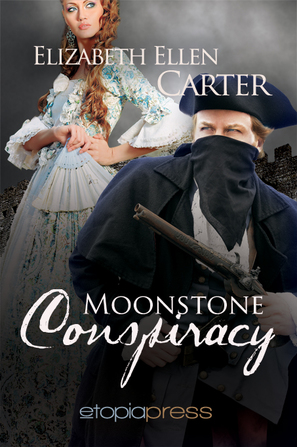
What would you risk for love?
With its incredible dangers and therefore its potential for great heroism, the French Revolution has offered writers the ultimate conflict against which to set great stories and strong characters.
Elizabeth Ellen Carter’s Moonstone Conspiracy joins the ranks this month as Lady Abigail and Daniel Ridgeway risk everything – life, love, and spies while avoiding Mme. La Guillotine.
Welcome, Elizabeth!
I love the French Revolution as a back drop. The events of 1789 shaped world affairs – politics, philosophy, economics, religion – and their effects are felt right to this day.
The French Revolution and indeed the French Republic was a grand experiment based on some very laudable ideals – the Americans shared some of those but appreciated the debt owed to the past. The French wanted to repudiate past altogether – and that turned out to be a brutal and bloody disaster.
The Reign of Terror amps up the stakes for Abigail and Daniel. Through their experiences in Paris, you can see how these two characters change and grow.
A certain favourite literary character of mine--Sink me!--makes an appearance. What considerations do you have to make when ‘borrowing’ such a well-known character?
It was important to me to keep him true to the beloved character that we know through the books and to a lesser extent the films, without Moonstone Conspiracy becoming ‘fanfiction’.
Nevertheless I took liberties with the character’s back story. When I was writing Moonstone Obsession (in which he makes a guest appearance) I wondered who Sir Percy Blakeney really was before he took on his swashbuckling persona, he had to be more than simply of man of leisure -- so one thing led to another and I ended up hinting at the events which take place in the first Scarlet Pimpernel book.
What was the most difficult aspect of writing this book?
It was fulfilling the promise Sir Percy makes to Abigail – turning the Jezebel into a Rahab. Abigail comes to regret her past, although she makes no apologies for it. She doesn’t care a jot for other people’s opinion, but her past life has left her careworn and tired and she has a scheme which she believes will finally throw off the shackles of her past. She looks at Lady Hamilton and her life in Naples (remember this is before her affair with Lord Nelson) and thinks if only she could leave England, she could leave her past behind.
I didn’t want Abigail to lose the acerbic edge which made her such a popular character – even if she was horribly mean to Selina Rosewall in Moonstone Obsession.
Abigail plays a mean game of cards and bets calculatedly. Ladies generally didn’t play and bet like she does. Can you share an interesting piece of research about card games of this period?
Abigail’s reputation as a demi-rep gives her a great deal of licence to flout convention to a great degree. Women did play cards and gambled quite avidly. Amongst the most notorious were Faro Ladies. They flouted King George III’s Proclamation Against Vice and were caught.
Faro was a fast paced card game – easy to learn and easy to lose. That’s why Abigail decides to hedge her bets by marking the cards used at her good friend Lady Jane Templeton’s house parties.
Did I mention that Abigail is a very naughty girl?
I love a spy story (I’m forever a fan of Daniel Craig’s James Bond). How did the spy game differ during the French Revolution?
In some respects, not a lot is different – especially for the spies who are in enemy territory.
You have to live on your wits, you have to be self-reliant -- you cannot afford to let people to get to know the real you or to form serious attachments (and this causes a lot of issues for Daniel).
You have to prepare to kill or be killed or to disappear without a trace at a moment’s notice. At first Abigail thinks that this is going to be another adventure, but she soon realises how high the stakes are.
It is a hard profession and it takes a great spy master to know what assets to push and when to pull them out for the sake of their physical and mental safety. Daniel comes to wonder whether Sir Percy knows what he’s really doing when it comes to the safety of Daniel’s friend and fellow spy, Jonathan Sawyer.
Excerpt
Daniel picked his moment carefully. He watched Sir Percy’s wife leave with another group soon after the announcement was made. And although he made no especial effort to hide, he nonetheless remained in the shadows. He pulled out a cigar and lit it on a nearby taper.
As soon as he heard the footman call for Sir Percy’s carriage, he stepped forward into the carriage and waited for Blakeney to join him.
“Send me to France, Percy,” he said as soon as the carriage jolted into motion.
“I’m not going to do that,” Blakeney replied.
“You can’t just leave Jonathan there!”
“He signed on knowing the same risks as you.”
“He has a wife and children!”
“And you seem inordinately fond of them,” Sir Percy snapped back. “You saw the list you gave me tonight. A dozen good men and women dead because of the Jacobins. I’m not prepared to risk more. Not until we know what we’re up against.”
“It could be too late!”
“You took an oath when you joined the League, Ridgeway. One to command, all to obey. Bear that in mind.”
Daniel leaned forward and rested his arms on his knees and exhaled long and sharp.
He felt Percy slap him on the back.
“Just wait a week until we know the lay of the land. I haven’t studied the documents you gave me and Parliament hasn’t even prepared a response to the National Committee’s declaration of war.”
“A week is a long time, Percy,” Daniel warned.
“So is eternity, dear chap. Don’t lose your head. As you well know, those Frenchies have a devilish way of parting you from it.”

 RSS Feed
RSS Feed
